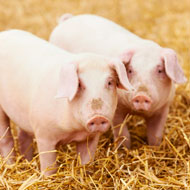Pig Association to review Livestock-Associated MRSA

The National Pig Association is to lead a discussion to come up with a strategy for dealing with LA-MRSA.
A review of the UK pig industry’s strategy on Livestock-Associated MRSA (LA-MRSA) is to be led by the National Pig Association (NPA).
The announcement follows a meeting between the NPA and the main UK breeding companies, during which it was agreed that relying on screening alone was not a holistic approach to dealing with the disease.
“As a result, the NPA is now in discussion with the Pig Health and Welfare Council about organising a roundtable discussion to come up with an industry-wide strategy for dealing with LA-MRSA,” said NPA senior policy advisor Georgina Crayford.
“The aim will be to agree appropriate measures to both minimise importation of the bacterium and prevent further spread between herds.”
According to advice published by the Food Standards Agency earlier this year, LA-MRSA poses a ‘very low risk’ to the public via food. To its knowledge, there have been no reported foodborne outbreaks of LA-MRSA in humans in either the UK or abroad.
“The prevalence of LA-MRSA in animals in other European countries appears to be significantly higher than in animals in the UK. Current data suggest that the prevalence of food contaminated with LA-MRSA is low in the UK,” the report concluded.
“The risk to human health from the preparation, handling and/or consumption of LA-MRSA/MRSA contaminated foodstuffs in the UK is very low, especially when compared to other routes of transmission.”



 The Federation of Independent Veterinary Practices (FIVP) has announced a third season of its podcast, Practice Matters.
The Federation of Independent Veterinary Practices (FIVP) has announced a third season of its podcast, Practice Matters.